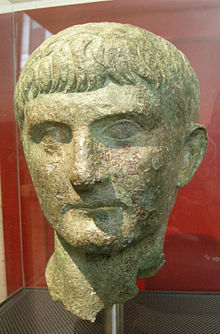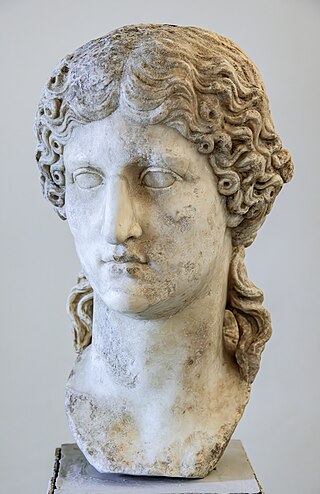
(Vipsania) Agrippina the Elder was a prominent member of the Julio-Claudian dynasty. She was the daughter of Marcus Vipsanius Agrippa and Augustus' daughter, Julia the Elder. Her brothers Lucius and Gaius Caesar were the adoptive sons of Augustus, and were his heirs until their deaths in AD 2 and 4, respectively. Following their deaths, her second cousin Germanicus was made the adoptive son of Tiberius, Augustus' stepson, as part of the succession scheme in the adoptions of AD 4. As a result of the adoption, Agrippina was wed to Germanicus in order to bring him closer to the Julian family.
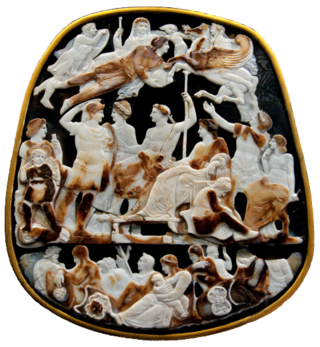
The Julio-Claudian dynasty comprised the first five Roman emperors: Augustus, Tiberius, Caligula, Claudius, and Nero.

Around the start of the Common Era, the family trees of the gens Julia and the gens Claudia became intertwined into the Julio-Claudian family tree as a result of marriages and adoptions.

Tiberius Julius Caesar Augustus was Roman emperor from AD 14 until 37. He succeeded his stepfather Augustus, the first Roman emperor. Tiberius was born in Rome in 42 BC to Roman politician Tiberius Claudius Nero and his wife, Livia Drusilla. In 38 BC, Tiberius's mother divorced his father and married Augustus. Following the untimely deaths of Augustus's two grandsons and adopted heirs, Gaius and Lucius Caesar, Tiberius was designated Augustus's successor. Prior to this, Tiberius had proved himself an able diplomat, and one of the most successful Roman generals: his conquests of Pannonia, Dalmatia, Raetia, and (temporarily) parts of Germania laid the foundations for the empire's northern frontier.
This article concerns the period 39 BC – 30 BC.
This article concerns the period 19 BC – 10 BC.
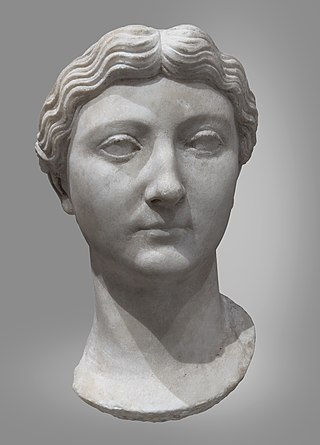
Livia Drusilla was Roman empress from 27 BC to AD 14 as the wife of Augustus, the first Roman emperor. She was known as Julia Augusta after her formal adoption into the Julia gens in AD 14.
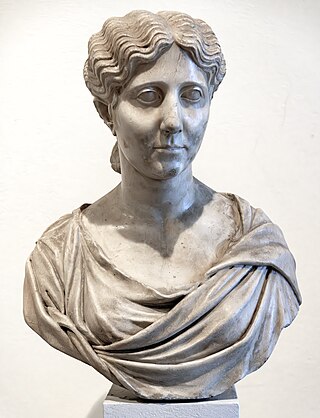
Antonia Minor was the younger of two surviving daughters of Mark Antony and Octavia Minor. She was a niece of the Emperor Augustus, sister-in-law of the Emperor Tiberius, paternal grandmother of the Emperor Caligula and Empress Agrippina the Younger, mother of the Emperor Claudius, and maternal great-grandmother of the Emperor Nero. She outlived her husband Drusus, her oldest son, her daughter, and several of her grandchildren.
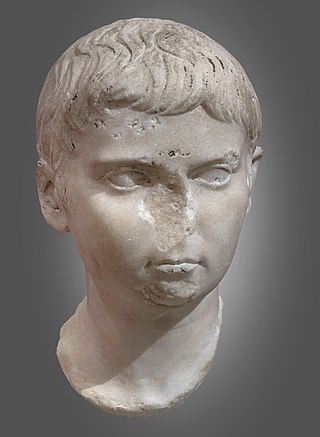
Marcus Agrippa Postumus, later named Agrippa Julius Caesar, was a grandson of Roman Emperor Augustus. He was the youngest child of Marcus Vipsanius Agrippa and Julia the Elder. Augustus initially considered Postumus as a potential successor and formally adopted him as his heir, before banishing Postumus from Rome in AD 6 on account of his ferocia. In effect, though not in law, the action cancelled his adoption and virtually assured Tiberius' emplacement as Augustus' sole heir. Postumus was ultimately executed by his own guards shortly after Augustus' death in AD 14.

The gens Claudia, sometimes written Clodia, was one of the most prominent patrician houses at ancient Rome. The gens traced its origin to the earliest days of the Roman Republic. The first of the Claudii to obtain the consulship was Appius Claudius Sabinus Regillensis, in 495 BC, and from that time its members frequently held the highest offices of the state, both under the Republic and in imperial times.
Julia is the nomen of various women of the family Julii Caesares, a branch of the gens Julia, one of the most ancient patrician houses at ancient Rome.

The gens Julia was one of the most prominent patrician families in ancient Rome. Members of the gens attained the highest dignities of the state in the earliest times of the Republic. The first of the family to obtain the consulship was Gaius Julius Iulus in 489 BC. The gens is perhaps best known, however, for Gaius Julius Caesar, the dictator and grand uncle of the emperor Augustus, through whom the name was passed to the so-called Julio-Claudian dynasty of the first century AD. The nomen Julius became very common in imperial times, as the descendants of persons enrolled as citizens under the early emperors began to make their mark in history.

Drusus Julius Caesar, also called Drusus the Younger, was the son of Emperor Tiberius, and heir to the Roman Empire following the death of his adoptive brother Germanicus in AD 19.

Lucius Caesar was a grandson of Augustus, the first Roman emperor. The son of Marcus Vipsanius Agrippa and Julia the Elder, Augustus' only daughter, Lucius was adopted by his grandfather along with his older brother, Gaius Caesar. As the emperor's adopted sons and joint-heirs to the Roman Empire, Lucius and Gaius had promising political and military careers. However, Lucius died of a sudden illness on 20 August 2 AD, in Massilia, Gaul, while traveling to meet the Roman army in Hispania. His brother Gaius also died at a relatively young age on 21 February 4 AD. The untimely loss of both heirs compelled Augustus to redraw the line of succession by adopting Lucius' younger brother, Agrippa Postumus as well as his stepson, Tiberius on 26 June 4 AD.

Vipsania Julia Agrippina nicknamed Julia Minor and called Julia the Younger by modern historians, was a Roman noblewoman of the Julio-Claudian dynasty. She was emperor Augustus' first granddaughter, being the first daughter and second child of Julia the Elder and her husband Marcus Vipsanius Agrippa. Along with her siblings, Julia was raised and educated by her maternal grandfather Augustus and her maternal step-grandmother Livia Drusilla. Just like her siblings, she played an important role in the dynastic plans of Augustus, but much like her mother, she was disgraced due to infidelity later on in her life.
Tiberius Claudius Nero was a Roman politician, senator, and praetor who lived in the last century of the Roman Republic.

Octavia the Younger was the elder sister of the first Roman emperor, Augustus, the half-sister of Octavia the Elder, and the fourth wife of Mark Antony. She was also the great-grandmother of the Emperor Caligula and Empress Agrippina the Younger, maternal grandmother of the Emperor Claudius, and paternal great-grandmother and maternal great-great-grandmother of the Emperor Nero.

Jeg elsket Tiberius is a 1959 romance novel by Elisabeth Dored. It was first translated into English by Naomi Walford in Great Britain by Methuen and United States by Pantheon Books in 1963 under the name I Loved Tiberius. The novel was written as a careful reappraisal of the contemporary sources, placing Julia and Tiberius in a more positive light. The novel is set in 1st century BC Rome, centred on Julia the Elder, the daughter of Augustus and her life right up until her death. The novel begins with Julia's birth and her mother being forbidden to see her. The plot is mainly focused on Julia's love life, notably her relationship with her stepbrother, Tiberius.

